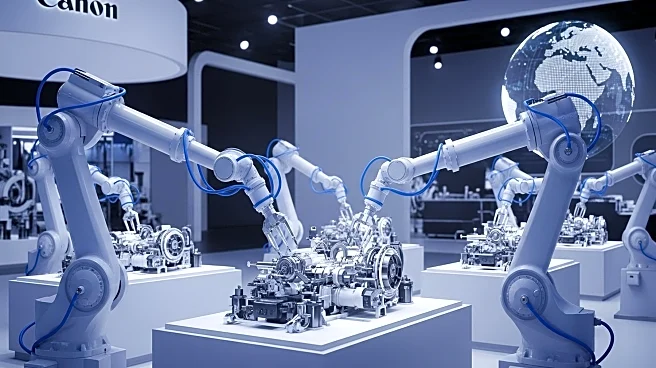What's Happening?
The 2025 World Manufacturing Convention, themed 'Intelligent Manufacturing for a Better Future,' concluded successfully in Hefei, China. The event, which spanned four days, brought together global leaders in manufacturing to highlight China's innovations and contributions to global manufacturing development. The convention featured over 30 major events, attracting government officials, business leaders, and representatives from international organizations across more than 40 countries. Notably, foreign attendees comprised over 50% of the participants, emphasizing the convention's role as a platform for international cooperation. Key reports, including the China Top 500 Manufacturing Enterprises and the Manufacturing Digital Transformation Capability Report, were released during the event. The convention also showcased cutting-edge technologies such as a manned lunar rover, a superconducting quantum computer, and high-end electric vehicles, underscoring China's advancements in new industrialization.
Why It's Important?
The convention's focus on intelligent manufacturing and technological innovation highlights China's growing influence in the global manufacturing sector. By facilitating 735 cooperation projects with a total investment of 380.2 billion yuan, the event serves as a significant bridge for dialogue and collaboration between China's manufacturing industry and global partners. This collaboration is crucial for advancing high-quality development in manufacturing worldwide. The convention's emphasis on artificial intelligence and robotics demonstrates China's commitment to leading in these fields, potentially impacting global manufacturing standards and practices. The event's success reflects China's strategic efforts to enhance its technological strength and open ecosystem, contributing to the global manufacturing upgrade.
What's Next?
The successful conclusion of the convention sets the stage for continued international collaboration and investment in China's manufacturing sector. Stakeholders, including government officials and business leaders, are likely to pursue further partnerships and projects initiated during the event. The focus on intelligent manufacturing and technological innovation may lead to increased adoption of advanced technologies in global manufacturing processes. As China continues to inject momentum into the global manufacturing upgrade, other countries may seek to align their strategies with China's advancements, fostering a more interconnected and cooperative global manufacturing landscape.
Beyond the Headlines
The convention's emphasis on intelligent manufacturing and technological innovation raises important ethical and cultural considerations. As China leads in artificial intelligence and robotics, questions about the impact on employment and workforce dynamics may arise. The integration of advanced technologies into manufacturing processes could lead to shifts in labor markets and require new skill sets. Additionally, the global collaboration fostered by the convention may influence cultural exchanges and understanding between participating countries, potentially leading to more harmonious international relations.









